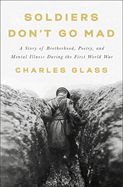
The First World War shattered not only men's bodies but also their minds in new and terrible ways. In Soldiers Don't Go Mad, journalist Charles Glass (They Fought Alone; Americans in Paris) uncovers the haunting stories of British junior officers, most prominently the poets Wilfred Owen and Siegfried Sassoon, who suffered from shell shock and found partial catharsis through treatment at the Craiglockhart War Hospital in Scotland. After the disastrous Battle of the Somme--in which 20,000 British soldiers were killed in one day--the British War Office established new hospitals to address the epidemic of shell shock. Leading psychiatrists of the day Drs. William Halse Rivers and Arthur Brock treated Sassoon and Owen, respectively, at Craiglockhart, allowing them and other "unblooded wounded" to express their experiences openly and with one other. Many did so through diaries, letters, illustrations, and poems, which Glass quotes from liberally throughout, to great emotional impact. It was the gift of psychotherapy, Glass says, that unlocked some of Owen's and Sassoon's most devastating verses about the war and what they witnessed. Indeed, Rivers and Brock "acted as midwives to their works by interpreting their nightmares, clarifying their thoughts, and encouraging them in their creations."
Glass captures the distinctive environment of Craiglockhart and its dynamic treatment for shattered psyches, though he is careful to point out that many "cured" officers would suffer trauma for the rest of their lives. Heartrending and inspirational, Soldiers Don't Go Mad is a moving elegy on the power of art to express the inexpressible. --Peggy Kurkowski, book reviewer and copywriter in Denver

